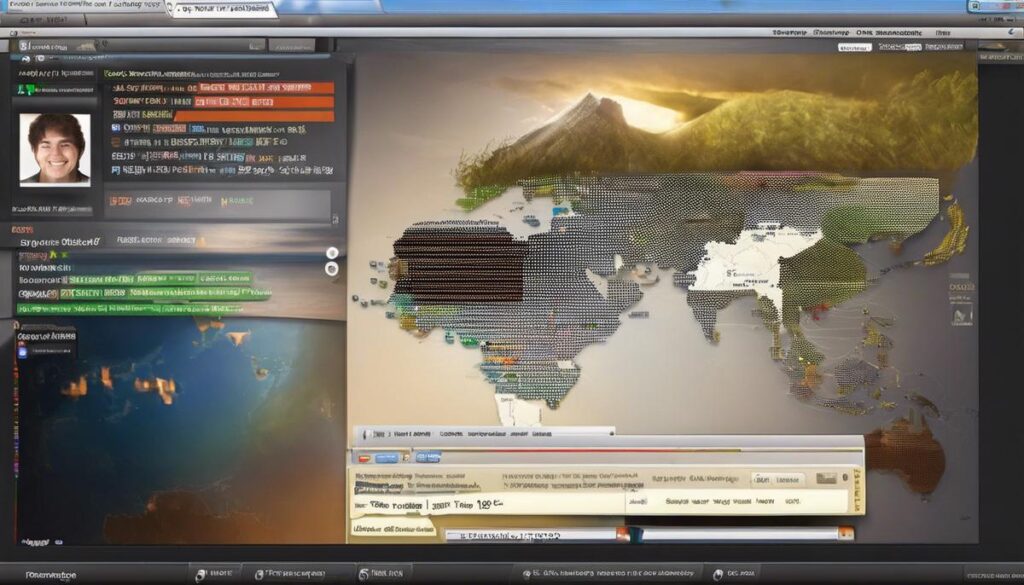In an increasingly interconnected world, the face of communication has taken a vast, diverse, and interactive shift. Random video chat apps exemplified by platforms such as Omegle, Chatroulette, and Azar have transformed the way we create new connections, initiating dialogues across borders and breaking down language barriers. These platforms embrace the thrill of the unexpected, building bridges between strangers, and promoting cultural exchanges. This discussion provides an insightful dive into these popular platforms, analyzing their features, advantages, impacts, and challenges.
Omegle: The Anonymous Approach
The debate around digital anonymity has always been contentious, and few places encapsulate it better than Omegle, the online chat website that pairs strangers for anonymous conversations. Lauded by some as a haven for freedom of speech, derided by others as a hotbed of misconduct, Omegle flings open the cloak of anonymity to its users. But does this cloak serve as an asset or a impediment to digital communication?
Anonymity enhances privacy. In a world where our digital footprints are tracked, stored, and analyzed, an anonymous platform like Omegle can feel like a breath of fresh air. It provides a platform where users can express their thoughts and opinions without fear of judgment or repercussions. This lack of bias promotes open conversations on the platform, leading to thought-provoking discussions that may not occur in regular social spheres.
The principle of zero accountability also fosters creativity and freedom. Users are liberated to explore different aspects of their persona that they otherwise might suppress due to societal constraints. This examples how the randomness and incognito of Omegle encourage an authentic self-expression.
However, anonymity could potentially breed irresponsibility. There are always those who take advantage of the lack of accountability, using the platform for harmful or offensive purposes. Abuse, harassment, and sharing of illegal content are unfortunately prevalent. It’s a societal reality that when individuals are not held accountable, some can teeter towards dangerous or harmful behavior.
Cleaning the cyberspace from unsolicited content gets murky with anonymous platforms. While measures like moderation and content algorithms can be employed, they are rarely foolproof. This shows the flip side of the coin, where anonymity’s virtues could as easily turn into vices.
Omegle’s anonymous model underscores its need for effective moderation and filters. This in turn underscores the dual nature of anonymity, serving as both a facilitator and potentially a disruptor of digital communication. Evolving this model into a safer, more responsible platform without compromising the roots of its appeal is the challenge ahead.
In conclusion, the asset or liability engendered by anonymity, as exemplified by Omegle, intricately varies from perspective. As technology enthusiasts, it’s our role to embrace these complexities and utilize technology’s potential to address them. The nuances of this balance between freedom and responsibility, privacy and safety, encapsulate the dichotomy at the core of digital communication today.

Chatroulette: Bridging Random Connections
Chatroulette’s groundbreaking emergence in 2009 introduced the world to real-time, random video chats, subsequently impacting online culture and digital communication patterns. While the platform has had its share of criticism, it has undeniably pivoted the way we socialize online, revolutionizing the culture, protocols, and trends that dictate real-time video networking.
As unpredictable as it is innovative, Chatroulette engendered the thrill of chance encounters, redefining the romanticism associated with meeting strangers. There was none of the premeditated uniformity found on dating platforms; instead, users enjoyed the unscripted spontaneity of randomness. This added an irresistible layer of excitement and anticipation, capturing the human curiosity for the unknown and unpredictable.
This microcosm of global interaction also began to challenge geographical divides, making the concept of distance virtually negligible. It painted a vivid picture of the expansive landscape of cultures, backgrounds, and experiences. For many, Chatroulette served as an informal global classroom, an eclectic blend of diversity in its most entertaining form.
Revitalizing the pendulum between individual solitude and collective inclusion, Chatroulette restructured the dynamics of privacy in digital spaces. With the click of a button, solitude transformed into instant camaraderie, fostering the toggle ability from ‘alone’ to ‘all-one.’ It encapsulated the allure of feeling globally connected while physically remaining individually isolated.
While live trolls and online exhibitionists were an undeniable part of the Chatroulette experience, the platform practically birthed creative social phenomena like the “Chatroulette Piano Improv,” where talented artists showcased their abilities to entertain an ever-changing audience. It vividly highlighted how technology can be used, not just for pragmatic purposes, but for inventive, culturally enriching experiences.
The platform also elevated the importance of real-time content moderation within digital platforms.Recognizing the potential risk of untoward content, it spurred technological advances in AI-driven monitoring systems, empowering future platforms with the learning to embed stricter control mechanisms and safeguard user experience.
Wordless goodbyes, an intrinsic part of the Chatroulette experience, could have sparked the popularity of ‘ghosting.’ With no explanations demanded or apologies needed, the culture of disconnecting without consequence became a recognizable part of online social experiences.
In essence, Chatroulette didn’t merely popularize random video chats, but also recalibrated the rhythm and ethos of digital communication. Its legacy transcends the platform itself, becoming a crucial catalyst in shaping the dynamics of real-time, virtual social interactions in the digital age.

Azar: Beyond Borders and Languages
Whether you’re a tech enthusiast or an everyday internet user, the rise of random video chat platforms has been hard to ignore. While these platforms have several pros and cons, it’s the integration of technology that’s prompting exciting developments. How? Let’s take a look at how Azar is revolutionizing the scene by breaking language barriers.
Azar is not only storming the digital fortress of random video chatting but also filling in the gaps of its predecessors, Omegle and Chatroulette. Right from the start, its game-changing approach emanates from its ultimate vision: seamless connection, regardless of language.
Because language should not be a hurdle in a globalized world, Azar is integrating real-time machine learning translation technologies into its video chatting interface. This innovation is lowering the wall between people who speak different languages while encouraging diverse conversations and connections.
Next, Azar is promoting a more inclusive digital community. With its translation feature, it eliminates language-based discrimination, promoting an environment that is inclusive and respects diverse perspectives. This further aids in nurturing digital conversations, enhancing sociocultural exchanges and fostering global unity.
Let’s not overlook Azar’s focus on security. The app uses state-of-the-art AI recognition systems to moderate content and reduce the risk of inappropriate or illegal content surfacing in chats. This, along with in-app reporting systems, ensures that users can communicate in a safe digital environment.
One of the major technical feats of Azar is its efficient algorithm which optimizes connectivity. The app runs smoothly, regardless of your geographical location. It’s paving the way for a more seamless user experience.
In essence, by breaking language barriers, Azar is taking a quantum leap in random video chats, building bridges and not walls. It’s a shining example of how technology can tear down barriers, and we’re all here for it!
In a world wrought with digital divides and pandemic-induced isolation, platforms like Azar are a beacon of hope. They lead us to a future where everyone, regardless of language or geography, can connect, communicate and understand one another – that’s the real beauty of innovation!

Throughout the digital era, platforms like Omegle, Chatroulette, and Azar have emerged as powerful tools in forging new relationships and enabling cultural understanding. Each with their unique features and challenges, these random video chat apps have significantly reshaped the concept of communication in our interconnected society. They offer us a lesson in embracing the unexpected, the power of anonymity, and the magic of spontaneity. The ongoing trends and innovations in this field hint at more advancements to come, promising a continued evolution in the way we connect and communicate.



